Blackjack in Popular Culture
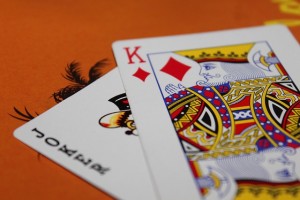 In my previous post, I outlined the different depictions of casino in popular culture and how they differ from each other, which was a post that I had an absolute blast writing! And judging by how many views it got, it seems like you guys had a blast reading it too, so… Let’s keep going into the world of popular culture, shall we? This time I’m not going to be nearly as detailed, firstly because I don’t really want to write another monstrous post, and second because I want to focus on one particular casino game – namely, blackjack! We all love blackjack, right? If you say you don’t like blackjack, you’re either lying or have never tried it, and I’m pretty positive of this when I say this! I often like to look up the casinos featuring the highest table limits and just compare them, not because I’m a super rich high roller or anything, but because I like the fantasy of being a high-profile blackjack player that sits down at a (virtual) table, bets a few grand and then expertly counts the cards and leaves richer than ever. It’s a very appealing fantasy that speaks to us on a fundamental level. We want to see smart, talented, charming and daring people take huge risks and be rewarded for it. Hell, practically all of our modern heroes, from James Bond to Tony Stark, are gamblers (often times literally). So is it any wonder we keep seeing blackjack pop up over and over again in our entertainment?
In my previous post, I outlined the different depictions of casino in popular culture and how they differ from each other, which was a post that I had an absolute blast writing! And judging by how many views it got, it seems like you guys had a blast reading it too, so… Let’s keep going into the world of popular culture, shall we? This time I’m not going to be nearly as detailed, firstly because I don’t really want to write another monstrous post, and second because I want to focus on one particular casino game – namely, blackjack! We all love blackjack, right? If you say you don’t like blackjack, you’re either lying or have never tried it, and I’m pretty positive of this when I say this! I often like to look up the casinos featuring the highest table limits and just compare them, not because I’m a super rich high roller or anything, but because I like the fantasy of being a high-profile blackjack player that sits down at a (virtual) table, bets a few grand and then expertly counts the cards and leaves richer than ever. It’s a very appealing fantasy that speaks to us on a fundamental level. We want to see smart, talented, charming and daring people take huge risks and be rewarded for it. Hell, practically all of our modern heroes, from James Bond to Tony Stark, are gamblers (often times literally). So is it any wonder we keep seeing blackjack pop up over and over again in our entertainment?
Probably the most famous example is the 2008 movie “21”, starring Jim Sturgess and Kevin “I’m going to be famous again in a few years, you guys” Spacey. This movie basically singlehandedly caused a resurgence in blackjack and card counting for a while, and with good reason – it’s pretty good, even if it’s somewhat clichéd. Based on the novel “Bringing Down The House”, which in itself is based on a supposedly real story (if a heavily dramatized one), the movie tells the story of a young MIT student named Ben who, alongside some of his classmates, decides to infiltrate the world of Vegas and use his card counting skills to make it big on the blackjack table. Like I said, the idea of a smart and talented guy making it big on the blackjack table isn’t new at all – in fact, it can be observed quite clearly in the 1988 movie “Rain Man”, in which the main character, played by Dustin Hoffman, suffers from autism, which obviously makes him a master at card counting, no prior knowledge required! This movie basically created the stereotype that all autistic people are secretly savants, which is the second most outrageous claim since the one stating that vaccine cause autism. But I digress. The scene in which Raymond manages to make it big in the casino despite the fact that he’d never set foot there was parodied in the 2009 movie “The Hangover”, where a group of guys celebrating a bachelor party in Vegas need to get out of some money trouble by basically speed-reading through a book on card counting and then hitting the casino floor.
But the blackjack fever has hit numerous fronts, not just movies. One of the most surprising one is anime, or Japanese animation. Not many have heard of Osamu Tezuka, but most have undoubtedly seen his style and creations in some form or another. Often cited the Father of Manga, Tezuka pretty much invented the modern anime style as we know it today. And, wouldn’t you know it, one of his most famous characters is known as Black Jack. Admittedly, Black Jack isn’t a gambler – he’s a doctor who works for money. But the manga, as well as the various anime adaptations Black Jack has appeared in, have made quite good use of the symbolism of his name (as you can see in the opening of his newest series, where playing cards are prominently featured), with one of his series even being named “Black Jack 21”. Additionally, plenty of books have been written about blackjack, and I’m not talking about card counting ones. Probably the most famous example is “Sucker Bet” by James Swain, in which the main character, ex-cop Tony Valentine (gotta love that name) is working security for a casino and discovers something rather peculiar about the blackjack table. In any case, I believe it’s fair to say that the game of blackjack has infiltrated any and all aspects of our popular culture, and it’s not hard to see why! It’s iconic, it’s timeless, it’s recognizable, and it allows us to see one of our favorite stories – of the intelligent hero persevering against all odds.

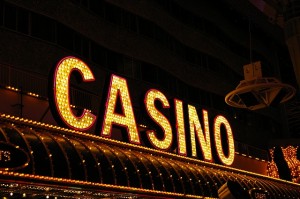 Hollywood is no stranger to casinos, which is absolutely understandable – considering just how much revenue they bring in every year just in Las Vegas alone, it’s safe to say that they’re a big part of American culture. As a result, many directors like to depict casinos within their motion pictures in an attempt to tap in on the casino market and attract the large casino crowd… Or just because they feel like it’ll enhance the story and make for a more cohesive plot, but that’s insane, isn’t it? However, one has to keep in mind that in many movies things aren’t quite what they seem. A skilled director can use a certain element not just for its face value, but also for its symbolic meaning. When Charles Foster Kane whispered “Rosebud” with his dying breath, he wasn’t just thinking of what a kick-ass sleigh he used to have as a kid, he was admitting that his childhood was the only time in which he was happy, and the director used his “Rosebud” sleigh as a symbol of that childhood happiness. Similarly, a lot of directors like to attach symbolic meaning to something as normal to us as casino, or casino games.
Hollywood is no stranger to casinos, which is absolutely understandable – considering just how much revenue they bring in every year just in Las Vegas alone, it’s safe to say that they’re a big part of American culture. As a result, many directors like to depict casinos within their motion pictures in an attempt to tap in on the casino market and attract the large casino crowd… Or just because they feel like it’ll enhance the story and make for a more cohesive plot, but that’s insane, isn’t it? However, one has to keep in mind that in many movies things aren’t quite what they seem. A skilled director can use a certain element not just for its face value, but also for its symbolic meaning. When Charles Foster Kane whispered “Rosebud” with his dying breath, he wasn’t just thinking of what a kick-ass sleigh he used to have as a kid, he was admitting that his childhood was the only time in which he was happy, and the director used his “Rosebud” sleigh as a symbol of that childhood happiness. Similarly, a lot of directors like to attach symbolic meaning to something as normal to us as casino, or casino games. 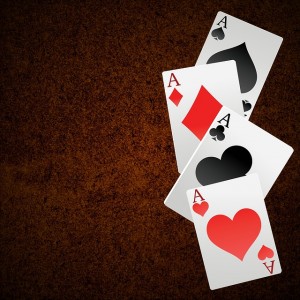 One of my favourite subjects to write about, discuss with friends or even just think about relates to the cultural acceptance of various gambling activities. Cultural acceptance, of course, refers to just how okay society in general is with a certain activity. Let’s take, for example, videogames. Before the year 2000, videogames were mostly viewed as entertainment for children – you mostly saw little kids in the arcades playing Pac-Man and Centipede. When the NES came out, the overwhelming majority of purchases were made by parents for their children, which is why there were almost no games for adults released in that era. When “Mortal Kombat” came out and featured highly comical (by our modern standards) blood and gore, everyone went nuts over it and insisted that the game be banned due to the idea that videogames were simply for children. But at some point gamers grew up, and by the early to mid 2000s, when consoles such as the PS1 started appearing on the market, for the first time in history they were being bought by adults for themselves as well as for their kids, which saw an increase in release of games that were more mature in tone, such as “Metal Gear Solid”.
One of my favourite subjects to write about, discuss with friends or even just think about relates to the cultural acceptance of various gambling activities. Cultural acceptance, of course, refers to just how okay society in general is with a certain activity. Let’s take, for example, videogames. Before the year 2000, videogames were mostly viewed as entertainment for children – you mostly saw little kids in the arcades playing Pac-Man and Centipede. When the NES came out, the overwhelming majority of purchases were made by parents for their children, which is why there were almost no games for adults released in that era. When “Mortal Kombat” came out and featured highly comical (by our modern standards) blood and gore, everyone went nuts over it and insisted that the game be banned due to the idea that videogames were simply for children. But at some point gamers grew up, and by the early to mid 2000s, when consoles such as the PS1 started appearing on the market, for the first time in history they were being bought by adults for themselves as well as for their kids, which saw an increase in release of games that were more mature in tone, such as “Metal Gear Solid”. As you all know, online casinos offer many treats to attract new users and reward the ones that have reached higher VIP statuses. But there is more to that than meets the eye and here is where this article comes in. I love playing online and bonuses are always the cherry on top. However, some offers are as good as they come, while others may actually harm your bankroll instead of giving it a boost. Here are the main three types of bonuses that you can receive and the terms and conditions that come with them. And, as a special treat, I will tell you how to play through your bonuses and cash-out faster.
As you all know, online casinos offer many treats to attract new users and reward the ones that have reached higher VIP statuses. But there is more to that than meets the eye and here is where this article comes in. I love playing online and bonuses are always the cherry on top. However, some offers are as good as they come, while others may actually harm your bankroll instead of giving it a boost. Here are the main three types of bonuses that you can receive and the terms and conditions that come with them. And, as a special treat, I will tell you how to play through your bonuses and cash-out faster.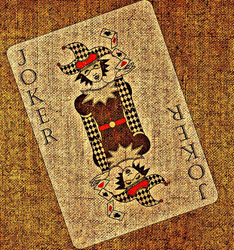 The exact origins of gambling are somewhat unknown, although many voices say that even the Bible holds several references to similar activities, such as casting lots to determine something or to divide property. While it would probably be mission impossible to determine where and how gambling came to be, the initial versions of card and table games are said to come from China and certain parts of Europe. No surprise there, if you keep in mind the fact that once the Chinese people invented paper, the next step was to make paper money. Once they did that, it was only a matter of time before they went on to create the first set of paper cards.
The exact origins of gambling are somewhat unknown, although many voices say that even the Bible holds several references to similar activities, such as casting lots to determine something or to divide property. While it would probably be mission impossible to determine where and how gambling came to be, the initial versions of card and table games are said to come from China and certain parts of Europe. No surprise there, if you keep in mind the fact that once the Chinese people invented paper, the next step was to make paper money. Once they did that, it was only a matter of time before they went on to create the first set of paper cards. A friend of mine recommended I watch this film, knowing that I am passionate about cards and Texas Hold’em, in particular. I must admit I was a bit skeptic, since most films about poker, gambling, and gamblers that I have watched were, imho, pretty thin and lacking substance. But imagine my surprise when I
A friend of mine recommended I watch this film, knowing that I am passionate about cards and Texas Hold’em, in particular. I must admit I was a bit skeptic, since most films about poker, gambling, and gamblers that I have watched were, imho, pretty thin and lacking substance. But imagine my surprise when I 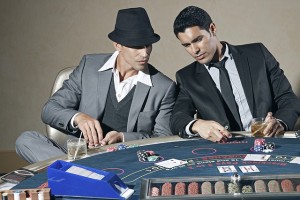 I open my blog with two of my favourite pieces of cinematography. The French film Bob le Flambeur was released in 1956 and an English-language remake was shot half a century later, The Good Thief starring Hollywood’s favourite bad boy, Nick Nolte. I first saw the American production, then dug out the French original from our college library to see it. Which one did I enjoy more? That is a nice question. Let me think about it.
I open my blog with two of my favourite pieces of cinematography. The French film Bob le Flambeur was released in 1956 and an English-language remake was shot half a century later, The Good Thief starring Hollywood’s favourite bad boy, Nick Nolte. I first saw the American production, then dug out the French original from our college library to see it. Which one did I enjoy more? That is a nice question. Let me think about it. I am Dorian (but not Gray), hailing from Manchester. I am 21 and I love several things in life. None of them goes well with the others. That’s why I have many blogs and maintain a number of personae on social media. Thank God for Internet anonymity! Clouding the sky rocks even when not done with style.
I am Dorian (but not Gray), hailing from Manchester. I am 21 and I love several things in life. None of them goes well with the others. That’s why I have many blogs and maintain a number of personae on social media. Thank God for Internet anonymity! Clouding the sky rocks even when not done with style.